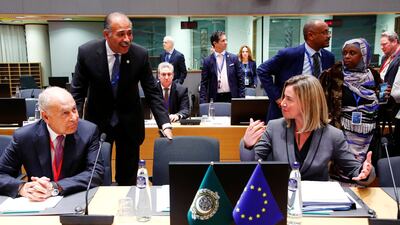The European Union sought to play down splits over its migration policy on Monday after Hungary’s hardline government disrupted preparations for the first summit between the bloc and the Arab League later this month.
Hungary blocked efforts to draw up a joint statement to form the basis of talks at Sharm El Sheikh, Egypt, because of long-standing differences between its strict anti-migration programme and more liberal policies of major EU nations such as France and Germany.
The EU’s foreign policy chief, Federica Mogherini, said that ministers from both sides agreed on 90-95 per cent of issues raised at a pre-summit meeting in Brussels but failed to mention migration when she detailed shared interests including Libya, Syria and the Palestinian issue.
She said both the EU and League were “complex organisations” but declined to comment on Hungary’s role in preventing a joint statement that was planned for the end of the ministerial-level meeting. She previously said the two blocs would seek to work together to “manage migration flows more safely and humanely”.
“It’s important to have statements but it’s even more important to have a clear idea of what we do together,” said Ms Mogherini.
Ahmed Aboul Gheit, secretary-general of the Arab League, said it was “premature” to reveal the Arab position on “illegal migration” before the summit.
“The bulk of immigrants trying to reach Europe are not Arabs,” he told a joint press conference with Ms Mogherini.
The summit will be held on February 24-25 in Egypt to discuss a new alliance between the two groupings and to discuss major issues including terrorism, radicalisation, regional conflicts, investment and climate change.
The migration crisis of 2015 prompted major shifts within European politics and prompted the rise of nationalist movements and governments, who want to close their borders to people moving from the Middle East and North Africa.
More than one million people made the sea crossing in 2015 but the number fell sharply to fewer than 140,000 in 2018, according to UN figures.
Hungarian prime minister Viktor Orban last month said that divisions in the 28-nation bloc were now over migration rather than left-right splits. His government blocked the agreed statement at a heated meeting of EU ambassadors on Friday, according to the website Politico.
A coalition of anti-migration governments that includes Hungary, Italy and Poland that has made it difficult for the bloc to come up with a unified position on the topic.
Hungary in 2015 built fences on is borders with Serbia and Croatia to hammer home the message that migrants were not welcome in the country.
Italy has repeatedly blocked the work of humanitarian agencies operating in the Mediterranean who seek to rescue stricken refugees trying to travel to Europe in small boats.

